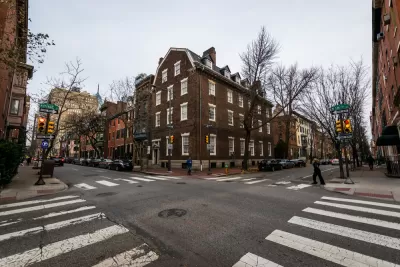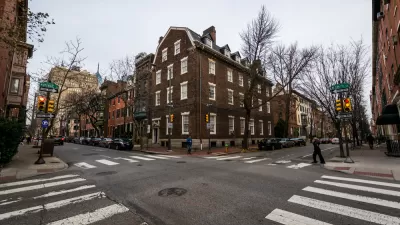The mayor, planning staff, and the Philadelphia Planning Commission agree. The Philadelphia City Council and residents of the wealthy neighborhood of Society Hill, not so much.

"Mayor Jim Kenney has once again vetoed a controversial zoning bill that sought to create a height ceiling in Philadelphia’s affluent Society Hill neighborhood," reports Ryan Briggs.
Planetizen picked up the news in September of legislation that the City Council would downzone the affluent neighborhood over the objections of planning staff and the Philadelphia Planning Commission. The legislation "would have limited development in the area to just 65 feet, or about six stories," according to Briggs.
To supplement the public information about the mayor's veto, Briggs has also obtained a letter from Mayor Kenney to the Society Hill Civic Association, which pushed for the zoning changes—in the letter, the mayor expresses support for a supply side approach to housing policy.
“Restricting overall development in Society Hill, the overlay will limit the supply of units necessary to meet housing demand,” Kenney said. “This will likely place undue pressure on surrounding communities to meet that demand, in turn driving housing prices higher and potentially displacing low-, moderate- and middle-income residents.”
In a previous article, Pat Loeb described the legislation thusly:
The bill would limit building height in the neighborhood, which runs from the Delaware River to 8th Street, between Walnut and Lombard. In some parts of it, buildings could not exceed 45 feet, limiting how much housing could be built there, decreasing the chances for creating mixed income units.
It also increases the number of parking spaces required for new development despite the city's goal of reducing private car use to relieve congestion, improve safety and fight climate change.
FULL STORY: Mayor Kenney vetoes Society Hill height limit

Alabama: Trump Terminates Settlements for Black Communities Harmed By Raw Sewage
Trump deemed the landmark civil rights agreement “illegal DEI and environmental justice policy.”

Planetizen Federal Action Tracker
A weekly monitor of how Trump’s orders and actions are impacting planners and planning in America.

Why Should We Subsidize Public Transportation?
Many public transit agencies face financial stress due to rising costs, declining fare revenue, and declining subsidies. Transit advocates must provide a strong business case for increasing public transit funding.

Understanding Road Diets
An explainer from Momentum highlights the advantages of reducing vehicle lanes in favor of more bike, transit, and pedestrian infrastructure.

New California Law Regulates Warehouse Pollution
A new law tightens building and emissions regulations for large distribution warehouses to mitigate air pollution and traffic in surrounding communities.

Phoenix Announces Opening Date for Light Rail Extension
The South Central extension will connect South Phoenix to downtown and other major hubs starting on June 7.
Urban Design for Planners 1: Software Tools
This six-course series explores essential urban design concepts using open source software and equips planners with the tools they need to participate fully in the urban design process.
Planning for Universal Design
Learn the tools for implementing Universal Design in planning regulations.
Caltrans
Smith Gee Studio
Institute for Housing and Urban Development Studies (IHS)
City of Grandview
Harvard GSD Executive Education
Toledo-Lucas County Plan Commissions
Salt Lake City
NYU Wagner Graduate School of Public Service



























